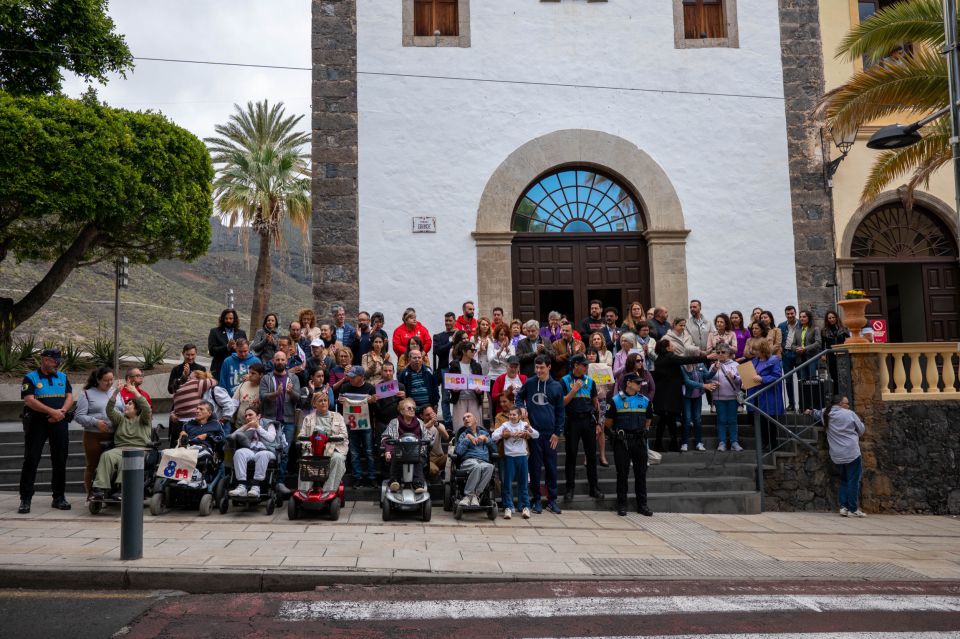
Adeje Town Hall marked International Women's Day today with an assembly calling for the defence of women's rights and the need to continue advancing towards real equality. The event was led by the mayor, José Miguel Rodríguez Fraga, alongside members of the local government, and the Adeje Equality Council. Representatives from the Equality Council read the manifesto during the gathering, which also saw the attendance of various social organisations and members of the public who joined the event.
The mayor of Adeje emphasised that in this struggle, “women and men must stand together; we do not want servants or slaves, but companions.” He also reaffirmed his commitment to “continue implementing measures through the Town Hall to make genuine equality a reality.”
The manifesto, written and read by members of the Adeje Equality Council, stressed that 8 March is a day of commemoration and struggle, paying tribute to generations of women who have worked tirelessly to build a fairer and more equal society. The text underlined that thanks to their efforts, significant progress has been made in securing rights such as access to education, political participation, and better conditions in the workplace.
However, the message was clear: the fight is not over. The manifesto stressed that inequalities, barriers, and forms of violence still persist, preventing women from fully participating in society. It called for continued unity and determination to ensure that hard-won rights are not rolled back. “No going back” was one of the key messages, reminding everyone that equality is not a permanently guaranteed right but a goal that requires ongoing effort to secure it and maintain it.
During the gathering, speakers also highlighted the importance of continuing to implement public policies to eradicate gender-based violence in all its forms, including physical, psychological, sexual, and economic abuse. They also stressed the need to ensure gender parity in decision-making and political representation, as well as the importance of recognising and valuing unpaid work, which is still largely carried out by women.
A month of awareness and reflection
This 8 March event is just one of many initiatives organised by Adeje Town Hall through the Department of Equality and Diversity, led by José Antonio López Delgado, as part of its March programme. Over the coming weeks, the agenda will feature conferences, exhibitions, training activities, and cultural events focusing on gender equality and the feminist movement.
Among the planned activities are film screenings, including the Spanish Goya award-winning ‘Cafuné’, which will be shown on Thursday, 13 March, at 7pm in the Adeje Auditorium. This will be followed by a discussion on legal protection for migrant women in the Canary Islands. The programme also includes theatrical performances such as ‘Las 13 Rosas’ this Saturday and 'Mercedes Pinto: 100 años de higiénica rebeldía (Mercedes Pinto: 100 Years of Hygienic Rebellion) on 20 March, both honouring key figures in the history of the fight for women's rights.
Additionally, the town hall has launched the Kalon Project, a training initiative at the CDTCA that addresses body image pressure and promotes self-acceptance, as well as the Quiérete Project, a self-care and emotional well-being workshop running until December. In the field of sport, a martial arts initiation workshop for women will be held on 18 and 25 March at the Las Torres pavilion, aiming to promote empowerment through physical activity. The series of events will conclude with a talk on mental health and gender-based violence, delivered by the Atelsam Association.
Finally, the 8 March programme in Adeje also includes the ‘Mujeres de Plata’ initiative, a space created by InspirarTeatro in collaboration with the Adeje Town Hall Communications Department. This initiative aims to highlight and recognise the role of older women in society. It seeks to showcase their experiences, memories, and contributions as witnesses and protagonists of major advances in gender equality. ‘Mujeres de Plata’ is not only a tribute to their life journeys but also an opportunity to foster intergenerational knowledge exchange, strengthening bonds and reinforcing the importance of equality at every stage of life.